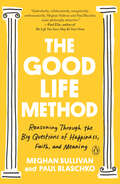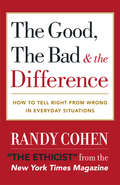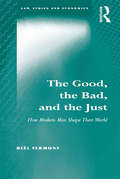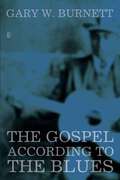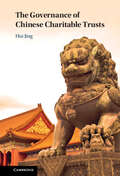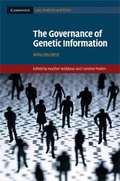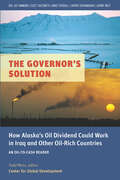- Table View
- List View
The Good Lawyer
by Adrian EvansThe Good Lawyer explores the ethical and professional challenges that confront people who work in the law - or are considering it - and offers principled and pragmatic advice about how to overcome such challenges. This book takes a holistic approach that begins with your innate humanity. It urges you to examine your motives for seeking a career in law, to foster a deep understanding of what it means to be 'good', and to draw on your virtue and judgement when difficult choices arise, rather than relying on compliance with rules or codes. The Good Lawyer analyses four important areas of legal ethics - truth and deception, professional secrets, conflicts of interest, and professional competence - and explains the choices that are available when determining a course of moral action. It links theory to practice, and includes many examples, diagrams and source documents to illustrate ethical concepts, scenarios and decision making.
The Good Life Method: Reasoning Through the Big Questions of Happiness, Faith, and Meaning
by Meghan Sullivan Paul BlaschkoTwo Philosophers Ask and Answer the Big Questions About the Search for Faith and HappinessFor seekers of all stripes, philosophy is timeless self-care. Notre Dame philosophy professors Meghan Sullivan and Paul Blaschko have reinvigorated this tradition in their wildly popular and influential undergraduate course &“God and the Good Life,&” in which they wrestle with the big questions about how to live and what makes life meaningful. Now they invite us into the classroom to work through issues like what justifies our beliefs, whether we should practice a religion and what sacrifices we should make for others—as well as to investigate what figures such as Aristotle, Plato, Marcus Aurelius, Iris Murdoch, and W. E. B. Du Bois have to say about how to live well. Sullivan and Blaschko do the timeless work of philosophy using real-world case studies that explore love, finance, truth, and more. In so doing, they push us to escape our own caves, ask stronger questions, explain our deepest goals, and wrestle with suffering, the nature of death, and the existence of God.Philosophers know that our &“good life plan&” is one that we as individuals need to be constantly and actively writing to achieve some meaningful control and sense of purpose even if the world keeps throwing surprises our way. For at least the past 2,500 years, philosophers have taught that goal-seeking is an essential part of what it is to be human—and crucially that we could find our own good life by asking better questions of ourselves and of one another. This virtue ethics approach resonates profoundly in our own moment.The Good Life Method is a winning guide to tackling the big questions of being human with the wisdom of the ages.
The Good Life in a Technological Age (Routledge Studies in Science, Technology and Society)
by Adam Briggle Philip Brey Edward SpenceModern technology has changed the way we live, work, play, communicate, fight, love, and die. Yet few works have systematically explored these changes in light of their implications for individual and social welfare. How can we conceptualize and evaluate the influence of technology on human well-being? Bringing together scholars from a cross-section of disciplines, this volume combines an empirical investigation of technology and its social, psychological, and political effects, and a philosophical analysis and evaluation of the implications of such effects.
The Good Life: An Introduction to Ethics
by Wolfgang PlegerThe book offers a historical-systematic overview of the most important concepts of ethics, each of which is presented using three to four exemplary main representatives. Central quotations allow textual access to the respective position, which is explained compactly and clearly. With the title “The Good Life” the author points to the anthropological basis of all ethics. The book is interdisciplinary in nature, incorporating philosophical approaches as well as those from the fields of theology, biology, psychology, sociology, and politics. For the 2nd edition, the book will be expanded to include the chapter “Education - Pedagogical Ethics” and a chapter on universal human rights.
The Good Life: Truths That Last in Times of Need
by Peter J. GomesThe author of the New York Times bestseller The Good Book champions the recovery of the Western moral tradition.
The Good Muslim
by Mona SiddiquiIn this unusual, thought-provoking and beautifully written book, Mona Siddiqui reflects upon key themes in Islamic law or theology. She has selected these topics, which range through discussions about friendship, divorce, drunkenness, love, slavery, and ritual slaughter, in part because they are of particular interest to her, and in part because they reveal fascinating insights into Islamic ethics, and the way in which arguments developed in medieval juristic discourse. These pre-modern religious works contained a richness of thought, hesitation and speculation on a wide range of topics, which were socially relevant but also presented intellectual challenges to the scholars for whom God's revelation could be understood in diverse ways. These subjects of course remain very relevant today, both for practicing Muslims and for scholars of Islamic law and religious studies, and the book shows just how these debates resonate in contemporary Islamic thought. Mona Siddiqui is an astute and articulate interpreter who relays complex ideas about the Islamic tradition with great clarity. These are important attributes for a book which, as the author acknowledges, charts her own journey through the classical texts, and reflects upon how the principles expounded there have guided her own thinking and impacted on her teaching and research.
The Good in the Right: A Theory of Intuition and Intrinsic Value
by Robert AudiThis book represents the most comprehensive account to date of an important but widely contested approach to ethics--intuitionism, the view that there is a plurality of moral principles, each of which we can know directly. Robert Audi casts intuitionism in a form that provides a major alternative to the more familiar ethical perspectives (utilitarian, Kantian, and Aristotelian). He introduces intuitionism in its historical context and clarifies--and improves and defends--W. D. Ross's influential formulation. Bringing Ross out from under the shadow of G. E. Moore, he puts a reconstructed version of Rossian intuitionism on the map as a full-scale, plausible contemporary theory. A major contribution of the book is its integration of Rossian intuitionism with Kantian ethics; this yields a view with advantages over other intuitionist theories (including Ross's) and over Kantian ethics taken alone. Audi proceeds to anchor Kantian intuitionism in a pluralistic theory of value, leading to an account of the perennially debated relation between the right and the good. Finally, he sets out the standards of conduct the theory affirms and shows how the theory can help guide concrete moral judgment. The Good in the Right is a self-contained original contribution, but readers interested in ethics or its history will find numerous connections with classical and contemporary literature. Written with clarity and concreteness, and with examples for every major point, it provides an ethical theory that is both intellectually cogent and plausible in application to moral problems.
The Good, the Bad & the Difference
by Randy CohenThe man behind the New York Times Magazine's immensely popular column "The Ethicist"-syndicated in newspapers across the United States and Canada as "Everyday Ethics"-casts an eye on today's manners and mores with a provocative, thematic collection of advice on how to be good in the real world.Every week in his column on ethics, Randy Cohen takes on conundrums presented in letters from perplexed people who want to do the right thing (or hope to get away with doing the wrong thing), and responds with a skillful blend of moral authority and humor. Cohen's wisdom and witticisms have now been collected in The Good, the Bad & the Difference, a collection of his columns as wise and funny as a combination of "Dear Abby," Plato, and Mel Brooks. The columns are supplemented with second thoughts on (and sometimes complete reversals of) his original replies, follow-up notes on how his advice affected the actions of various letter writers, reactions from readers both pro and con, and observations from such "guest ethicists" as David Eggers and the author's mom. Each chapter also features an "Ethics Pop Quiz," and readers will be invited to post their answers on the book's Web site. The best of them will appear in a future paperback edition of the book.The Good, the Bad & the Difference is divided into seven sections: *Civic Life (what we do in public) *Family Life (what we do at home) *Social Life (what we do in other people's homes) *Commercial Life (what we do in situations where money is a factor) *Medical Life (the rights and obligations of patients and caregivers) *Work Life (ethics for the professional sphere) *School Life (moral questions from and about kids)Each section provides a window into how we live today, shedding light on the ways in which a more ethical approach to the decisions we make, and to our daily behavior, can make a big difference in how we feel about ourselves tomorrow.From the Hardcover edition.
The Good, the Bad, and the Just: How Modern Men Shape Their World (Law, Ethics and Economics)
by Riël VermuntDrawing on multidisciplinary findings and ideas, this book discusses fair allocation of social resources, such as goods, services and information, in a novel and integrated way. The role of the essential features of allocation behavior: motivation, cognition and emotion, as well as morality and reactions to perceived unfairness are examined in the newly developed Justice Model. The author offers explanations as to why, how and to what extent, people, in an effort to attain justice, allocate social resources between self and others and among others. It is held that the allocation event, featuring actor, recipient and observer, as well as the resources to be allocated by an actor, can function as a guideline for the essentials of fair behavior. The work explores the conditions under which an actor may deviate from a just division of social resources thus instigating a reaction from recipients and observers. The study covers various levels of analysis ranging from the intra-personal to the societal. The book will be of interest to academics and researchers working in the areas of crime, law, justice, public policy and governance.
The Good, the True, and the Beautiful
by Jean-Pierre ChangeuxIn this fascinating and bold discussion, a renowned neurobiologist serves as guide to the most complex physical object in the living world: the human brain. Taking into account the newest brain research—morphological, physiological, chemical, genetic—and placing these findings in the context of psychology, philosophy, art, and literature, Changeux ventures into the unexplored territories where these diverse disciplines intersect. Changeux's book draws on Plato's notion that the Good, the True, and the Beautiful are celestial essences or ideas, independent but so intertwined as to be inseparable. Placing these essences within the characteristic features of the human brain's neuronal organization, the author addresses unsolved questions in neuroscience today. With imagination and deep insight, Changeux illuminates the evolution of the brain and deciphers what new developments in neuroscience may portend for the future of humanity.
The Good-Enough Life
by Avram AlpertHow an acceptance of our limitations can lead to a more fulfilling life and a more harmonious societyWe live in a world oriented toward greatness, one in which we feel compelled to be among the wealthiest, most powerful, and most famous. This book explains why no one truly benefits from this competitive social order, and reveals how another way of life is possible—a good-enough life for all.Avram Alpert shows how our obsession with greatness results in stress and anxiety, damage to our relationships, widespread political and economic inequality, and destruction of the natural world. He describes how to move beyond greatness to create a society in which everyone flourishes. By competing less with each other, each of us can find renewed meaning and purpose, have our material and emotional needs met, and begin to lead more leisurely lives. Alpert makes no false utopian promises, however. Life can never be more than good enough because there will always be accidents and tragedies beyond our control, which is why we must stop dividing the world into winners and losers and ensure that there is a fair share of decency and sufficiency to go around.Visionary and provocative, The Good-Enough Life demonstrates how we can work together to cultivate a good-enough life for all instead of tearing ourselves apart in a race to the top of the social pyramid.
The Gospel According to the Blues
by Gary W. BurnettThe Gospel According to the Blues dares us to read Jesus's Sermon on the Mount in conversation with Robert Johnson, Son House, and Muddy Waters. It suggests that thinking about the blues - the history, the artists, the songs - provides good stimulationfor thinking about the Christian gospel. Both are about a world gone wrong, about injustice, about the human condition, and about hope for a better world. In this book, Gary Burnett probes both the gospel and the history of the blues, to help us understand better the nature of the good news that Jesus preached, and its relevance and challenge to us.
The Governance Structures of Chinese Firms: China's Innovation System and Chinese Model (Innovation, Technology, and Knowledge Management)
by Chun LiaoThis book systematically defines and analyses the rise of China’s innovation system and Chinese corporate governance model. China’s achievement in artificial intelligence and high technology innovation has attracted the global attention. The country’s innovation system and Chinese model arose during the period between the mid-1990s and the first decade of 21 century, making it one of the leading countries in those fields. This revised and expanded edition examines the Chinese innovation business model based on the basic concept of firm’s governance structure. It builds upon five dimensions: ownership and shareholding structure; interrelation between employer and employee; interrelation between firms; financing pattern and performance criteria; and innovation system and core competitiveness. This book also compares China’s innovation system with the American model and with the European model exemplified by Germany.
The Governance of Genetic Information: Who Decides?
by Heather Widdows Caroline MullenThis volume maps the areas of ethical concern in the debate regarding the governance of genetic information, and suggests alternative ethical frameworks and models of regulation in order to inform its restructuring. Genetic governance is at the heart of medical and scientific developments, and is connected to global exploitation, issues of commodification, commercialisation and ownership, the concepts of property and intellectual property and concerns about individual and communal identity. Thus the decisions that are made in the next few years about appropriate models of genetic governance will have knock-on effects for other areas of governance. In short the final answer to 'Who Decides?' in the context of genetic governance will fundamentally shape the ethical constructs of individuals and their networks and relationships in the public sphere.
The Governance of Insurance Undertakings: Corporate Law and Insurance Regulation (AIDA Europe Research Series on Insurance Law and Regulation #6)
by Kyriaki Noussia Pierpaolo MaranoThis open access volume of the AIDA Europe Research Series on Insurance Law and Regulation brings together contributions from authors with different legal cultures. It aims to identify the legal issues that arise from the intersection of two disciplines: insurance law and corporate/company law. These legal issues are examined mainly from the perspective of European Union (EU) law. However, there are also contributions from other legal systems, enriching the perspective with which to approach these issues.
The Governance of Privacy: Privacy as Process: The Need for Resilient Governance
by Hans BruijnWe can hardly underestimate the importance of privacy in our data-driven world. Privacy breaches are not just about disclosing information. Personal data is used to profile and manipulate us - sometimes on such a large scale that it affects society as a whole. What can governments do to protect our privacy? In The Governance of Privacy Hans de Bruijn first analyses the complexity of the governance challenge, using the metaphor of a journey. At the start, users have strong incentives to share data. Harvested data continue the journey that might lead to a privacy breach, but not necessarily - it can also lead to highly valued services. That is why both preparedness at the start of the journey and resilience during the journey are crucial to privacy protection. The book then explores three strategies to deal with governments, the market, and society. Governments can use the power of the law; they can exploit the power of the market by stimulating companies to compete on privacy; and they can empower society, strengthening its resilience in a data-driven world.
The Governance of Solar Geoengineering: Managing Climate Change in the Anthropocene
by Jesse L. ReynoldsClimate change is among the world's most important problems, and solutions based on emission cuts or adapting to new climates remain elusive. One set of proposals receiving increasing attention among scientists and policymakers is 'solar geoengineering', (also known as solar radiation modification) which would reflect a small portion of incoming sunlight to reduce climate change. Evidence indicates that this could be effective, inexpensive, and technically feasible, but it poses environmental risks and social challenges. Governance will thus be crucial. In The Governance of Solar Geoengineering, Jesse L. Reynolds draws on law, political science, and economics to show how solar geoengineering is, could, and should be governed. The book considers states' incentives and behavior, international and national law, intellectual property, compensation for possible harm, and non-state governance. It also recommends how solar geoengineering could be responsibly researched, developed, and - if appropriate - used in ways that would improve human well-being and ensure sustainability.
The Governance of Telecom Markets: Economics, Law and Institutions in Europe (Palgrave Studies in Institutions, Economics and Law)
by Antonio Nicita Antonio ManganelliThis book provides a critical comprehensive summary of the coevolution of telecom markets, rules and public institutions over the last 25 years, focusing on the challenges that regulators and policy makers have been facing. Even if the perspective of the book is European (as the EU regulatory framework is examined), most of the economic and institutional issues addressed are common to all telecom markets in advanced economies. The book addresses some traditional fundamental topics in the telecom regulation literature, as well as some hot-button topics in the current policy debate, e.g., ultrafast broadband and 5G networks, the relationship between investments and competition, the sector digitalisation and the role of OTTs. All these are relevant to students, researchers, and policy makers interested to get a sound understanding of the sector, its many dimensions and coevolutionary patterns.
The Government of Disasters: State Formation and Disaster Management In South Africa
by Lydie CabaneThis book examines the history of disaster management in South Africa, showing how experts, professionals and policymakers have crafted and implemented disaster policies from the mid-twentieth century to the present day. It assesses the ways in which states become concerned with disasters, the extent to which disaster management contributes toward state formation, and who and what disaster management protects. It also considers the ways in which the politics of protection continuously shift as political regimes change. In telling the story of how policies surrounding disaster protection have evolved in South Africa, the book demonstrates how the security apparatus that shaped disaster management was re-oriented in the twenty-first century towards development, alongside bureaucratic reforms that aimed to democratize the state. By examining the wider context of the globalization of disaster management, it also highlights the often unrecognised role of experts from Africa, Latin America and Asia in shaping global disaster policies. The book will appeal to scholars and students of disaster governance, public policy, state formation, and African politics.
The Government's Speech and the Constitution (Cambridge Studies on Civil Rights and Civil Liberties)
by Helen NortonWhen we discuss constitutional law, we usually focus on the constitutional rules that apply to what the government does. Far less clear are the constitutional rules that apply to what the government says. When does the speech of this unusually powerful speaker violate our constitutional rights and liberties? More specifically, when does the government's expression threaten liberty or equality? And under what circumstances does the Constitution prohibit our government from lying to us? In The Government's Speech and the Constitution, Professor Helen Norton investigates the variety and abundance of the government's speech, from early proclamations and simple pamphlets, to the electronic media of radio and television, and ultimately to today's digital age. This enables us to understand how the government's speech has changed the world for better and for worse, and why the government's speech deserves our attention, and at times our concern.
The Governor
by John LonerganIn his talks to communities throughout the length and breath of Ireland, John Lonergan finds himself coming back to one theme: the importance of kindness. It is an unexpected theme for the former boss of Ireland's biggest and toughest prison, Mountjoy, but then John Lonergan is an unusual man. John entered the prison service in 1968 and in the years that followed, as he saw human nature at its worst - and often, unexpectedly, at its best - he developed a deep understanding both of human nature and of Irish society.Now, after 42 years in the service, 26 of them as the most senior prison officer in the country, John tells his fascinating life story - from his idyllic childhood in rural Tipperary, to coming face to face with the ugliest face of Irish life, to grappling with the politics of working in a service that was the plaything of officials and politicians. His description of life in the prison service is not only a gripping account of humanity at its rawest, but also an invaluable primer for anyone in top level management.Revealing, surprising and inspiring The Governor gives a unique insight into modern Ireland.
The Governor's Solution: How Alaska's Oil Dividend Could Work in Iraq and Other Oil-Rich Countries
by Todd MossReliance on natural resource revenues, particularly oil, is often associated with bad governance, corruption, and poverty. <P><P>Worried about the effect of oil on Alaska, Governor Jay Hammond had a simple yet revolutionary idea: let citizens have a direct stake. The Governor's Solution features his firsthand account that describes, with brutal honesty and piercing humor, the birth of the Alaska Permanent Fund dividend, which has been paid to each resident every year since 1982.Thirty years later, Hammond's vision is still influencing oil policies throughout the world. This reader, part of the Center for Global Development's Oil-to-Cash initiative, includes recent scholarly work examining Alaska's experience and how other oil-rich societies, particularly Iraq, might apply some of the lessons. It is as a powerful reminder that the combination of new ideas and determined individuals can make a tremendous difference-even in issues as seemingly complex and intractable as fighting the oil curse.
The Governor's Wife
by Mark GimenezHave you ever wondered how one split-second decision could change your life for ever?The Bonners are the most powerful couple in Texas. Bode Bonner is the Republican Governor and his wife, Lindsay, is always by his side. From the outside everything looks rosy.But the Bonners are not happy. Bode is bored - he longs for more excitement in his life. Lindsay is at the end of her tether. She's had enough of Bode's womanising and of playing the dutiful wife.She is desperate to break free of her bland, wealthy lifestyle.Then Lindsay makes an impulsive decision that helps save the life of a poor Hispanic boy. From that moment on, nothing will be the same for the Bonners. Everything is about to change...From the author of the international bestsellers The Colour of Law and Accused, this is an addictively readable novel, filled with dramatic and ingenious twists and turns, that delves deep into the dark heart of Texas.
The Governor's Wife
by Mark GimenezHave you ever wondered how one split-second decision could change your life for ever?The Bonners are the most powerful couple in Texas. Bode Bonner is the Republican Governor and his wife, Lindsay, is always by his side. From the outside everything looks rosy.But the Bonners are not happy. Bode is bored - he longs for more excitement in his life. Lindsay is at the end of her tether. She's had enough of Bode's womanising and of playing the dutiful wife.She is desperate to break free of her bland, wealthy lifestyle.Then Lindsay makes an impulsive decision that helps save the life of a poor Hispanic boy. From that moment on, nothing will be the same for the Bonners. Everything is about to change...From the author of the international bestsellers The Colour of Law and Accused, this is an addictively readable novel, filled with dramatic and ingenious twists and turns, that delves deep into the dark heart of Texas.

